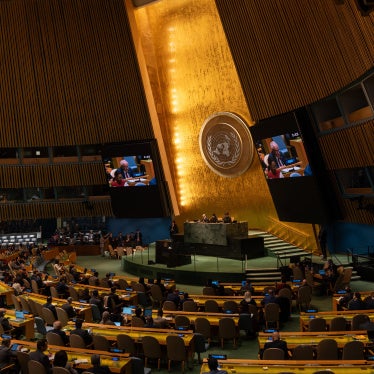Your Excellency:
On July 15, 2006, the Security Council adopted Resolution 1695 with the goal of maintaining peace and stability on the Korean Peninsula. While that Resolution understandably focused on North Korea’s recent missile tests and on the issue of non-proliferation, we regret that it omitted any mention of the systematic denial of North Koreans’ internationally recognized human rights and their humanitarian plight. We strongly believe that future efforts to promote stability on the Peninsula must address both the issues of peace and security and human rights. It is important for the Security Council to send the message to the government in Pyongyang that it must improve its treatment of its people. If the international community does not prioritize these concerns, there is no reason to believe the North Korean authorities will.
Even if diplomatic efforts to discourage North Korea’s pursuit of nuclear weapons succeed, the underlying tensions on the Korean Peninsula that are a source of potential conflict will not necessarily ease. Ongoing constraints on human rights and a deeper humanitarian crisis in North Korea will clearly have implications for the stability of the region. Those tensions, and the division of the Peninsula from which they arise, are far more likely to be overcome as North Korea becomes a more open society, where human rights are respected, and basic human needs are met.
North Korea remains one of the world’s most closed societies. There is no organized political opposition, labor activism, or independent civil society. Freedom of expression, information and religion are almost non-existent. Thousands of North Koreans languish in forced labor camps, where torture is endemic. Many die in prison because of mistreatment, malnutrition, and lack of medical care. The government of North Korea has consistently refused to allow U.N. human rights rapporteurs and other independent and impartial organizations to investigate the situation inside North Korea, despite two successive resolutions of the U.N. Commission on Human Rights urging that it do so. The U.N. Special Rapporteur on the human rights situation in North Korea has been denied entry into the country.
Because of the lack of respect for basic human rights and poor governance, millions of North Koreans also continue to suffer chronic malnutrition, in part because access to food and other basic services is provided according to a classification scheme based on the government’s assessment of an individual’s and his or her family’s political loyalty. During the 1990s, the government’s policies contributed to a famine that killed an estimated one million North Koreans, while pushing hundreds of thousands more to seek food and refuge in China. Decisions by the North Korean government over the past year to place restrictions on the operations of the World Food Programme, ban the private sale of grain, and fully reinstate its discredited Public Distribution System, in addition to reportedly severe floods this summer, could lead to renewed hunger for North Korea’s already poor and destitute people, and a further exodus of North Koreans across the country’s frontiers.
Even if North Korea abandons its nuclear program, a regime that continues to repress and starve its people remains highly unstable. The Security Council itself has on several occasions recognized the link between repression and human rights abuses and threats to peace and stability. We therefore urge the Security Council, when it next takes up the issue of North Korea, to support a broader dialogue with North Korea that will encompass the full range of issues affecting the stability and future of the Korean Peninsula, including humanitarian and human rights concerns. If progress in talks on the nuclear issue leads to consideration of significant economic benefits to the North Korean government, it is crucial that specific benchmarks, including access to North Korea by U.N. human rights experts, greater freedom of movement for North Korea’s people, and greater access and transparency in humanitarian aid, also be established.
Even if the initial goals of such a dialogue are modest, the North Korean government should understand now that these are important international concerns. Including them in future Security Council resolutions will contribute to that effort.
We thank you for your attention to this important matter.
Sincerely,
Sophie Richardson
Deputy Director, Asia Division
Human Rights Watch
Joel R. Charny
Vice President for Policy
Refugees International
Debra Liang-Fenton
Executive Director
U.S. Committee for Human Rights in North Korea
Aidan McQuade
Director
Anti-Slavery International
Benjamin H. Yoon
Representative
Citizens' Alliance for North Korean Human Rights







